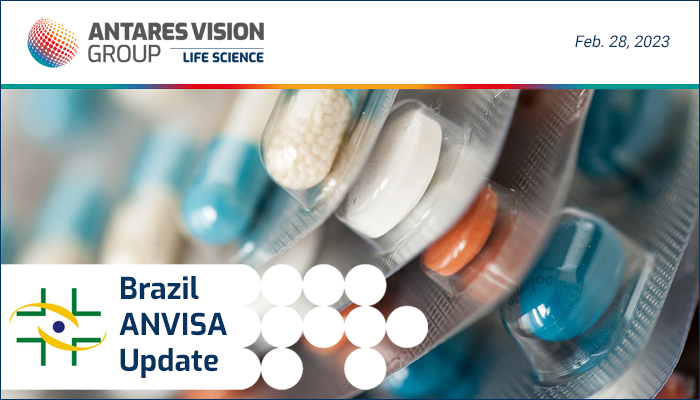We thought it was time for a Brazil ANVISA update. News has been sporadic since last September, when the Brazilian Health Regulatory Agency — ANVISA — permanently suspended its contract with DataPrev to develop and manage the country’s National Medicine Control System (SNCM).
Let’s catch up with what’s been happening.
Brazil ANVISA update, Part 1: What happened in 2022?
We’ve been following Brazil’s pharma regulations regularly since the SNCM was established in 2016. There were several delays in the rollout, but as we wrote early last year, the industry was anticipating an April 28, 2022, deadline to comply with the SNCM’s serialization, reporting, and traceability requirements.
However, just before that date, the SNCM was put on hold. Events start to cascade from there:
-
-
- May 12: Law No. 14,338/2022 was enacted. This mandated that manufacturers had to provide digital versions of the printed inserts included in drug packaging. The inserts had to have a QR code linked to a digital version maintained in a database authorized by ANVISA. The law also confirmed that ANVISA intended to have a drug traceability system, but did not stipulate a timeline for implementing it.
- May 23: ANVISA suspended its contract with SNCM developer DataPrev for 120 days.
- September 12: ANVISA dissolves its contract with DataPrev, and test and production environments were not accessible. The SNCM is effectively suspended.
-
In case you need a refresher, the SNCM was going to require every pharma supply chain actor to capture, store, and exchange data electronically. All products were to be labeled with a GS1 2D Data Matrix barcode with five data points:
-
-
- Global Trade Item Number (GTIN)
- A 13-digit ANVISA Medicine Registry Number
- A unique 13-digit serial number
- An expiration date (in the MM/YY format for human-readable form)
- A lot/batch number (up to 20 alphanumeric characters)
-
For the April 28, 2022, deadline specifically, all prescription medicines had to be serialized; all manufacturers and importers had to have a “serialization plan” in the SNCM portal; and all supply chain stakeholders had to submit product event reports to the SNCM.
Brazil ANVISA update, Part 2: Will the SNCM resume in 2023?
On February 14, 2023, a Brazilian publication called JOTA, which monitors Brazil’s government and whose stated mission “is to make Brazilian institutions more predictable,” published an interview with ANVISA Director-President Antonio Barra Torres.
Torres said “the merits of traceability are still alive,” adding the time was right to resume the discussion about the SNCM. Other key takeaways from the interview included the following:
-
-
- Torres said ANVISA was ready, technologically, to support the SNCM; resumption should be able to occur quickly.
- He believes big manufacturers and most smaller ones are ready to comply.
- He expects the World Health Organization (WHO) will inspect the SNCM in 2024; the Pan American Health Organization (PAHO) has also offered to inspect the system.
- He said traceability data wouldn’t solve drug shortages, but could contribute to mitigation strategies.
- ANVISA is currently short-staffed and needs to fill about 1,110 positions.
-
Brazil ANVISA update, Part 3: Medical device regulations
New medical device regulations were supposed to go into effect this month but were put on hold. Here’s the context:
Law RDC 751/2022 was passed September 21, 2022. It included rules for medical device classification and regulatory regimes and replaced two previous laws, RDC 185/2001 and RDC 40/2015. Here are some of the requirements in simple terms:
-
-
- Risk classification of medical devices is consolidated into four levels (low, medium, high, maximum). The classifications rules and medical device definitions generally follow the European Medical Device Regulation (MDR).
- There are specific classification rules for new technologies, including software as a medical device (SaMD) and nanomaterials.
- Manufacturers must upload medical device instructions for use to an ANVISA portal.
- Instructions for use, labels, and ANVISA documentation must be in Portuguese; other documents can be in English.
- The law includes requirements for Brazilian Good Manufacturing Practices.
- The law does not apply to vitro diagnostic devices, refurbished devices, and personal medical devices.
-
At the time we’re writing this, it seems the proposed timeline to comply with the new classification rules will begin next year and end in 2028.
Final thoughts
We’ll continue monitoring what’s happening with ANVISA and the SNCM — the entire global regulatory landscape — so bookmark our blog and check back often.
If you have questions about the regulations, contact us today. Our team in Brazil can walk you through what to expect for 2023 and beyond and demonstrate how our pre-configured and pre-validated solutions take the guesswork out of SNCM compliance. We’ve been ready to go since 2016 and we’re ready to go today.





